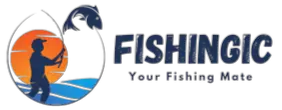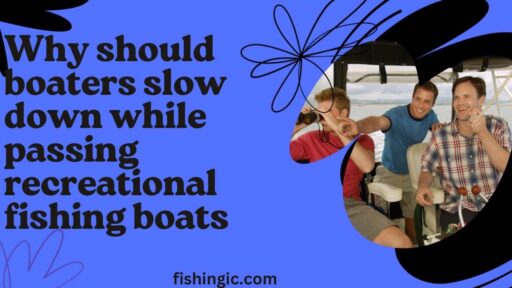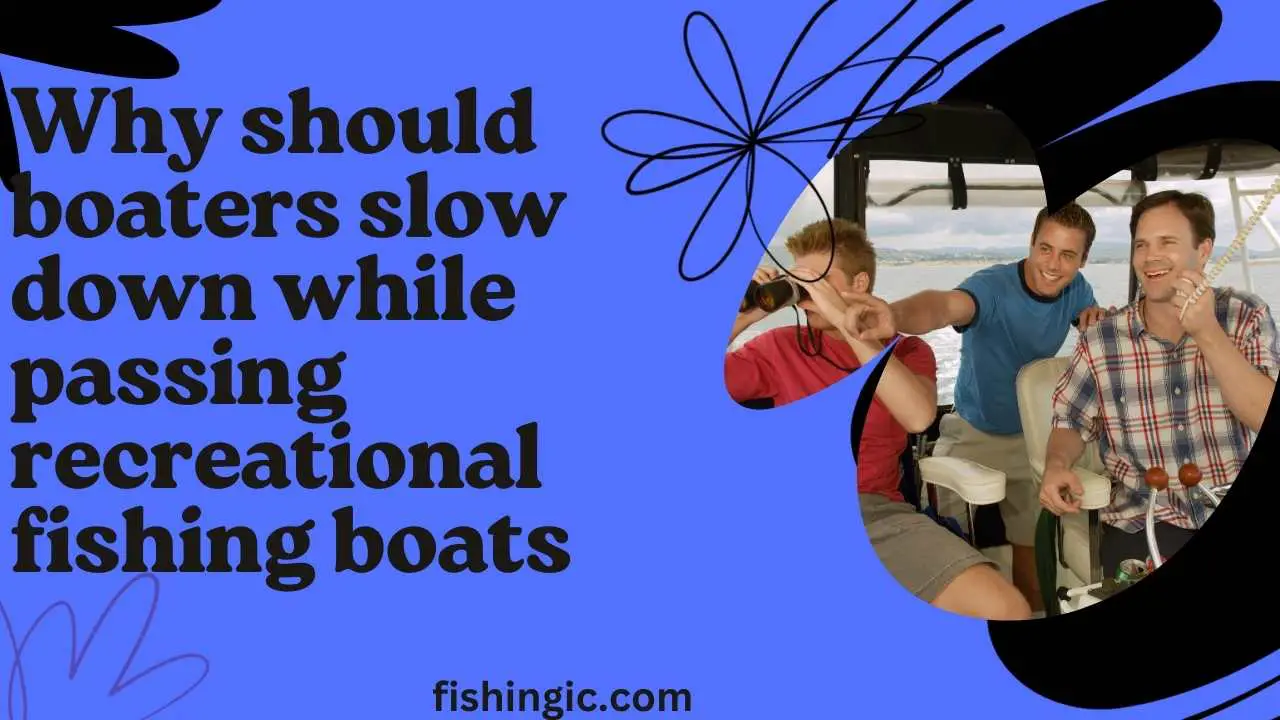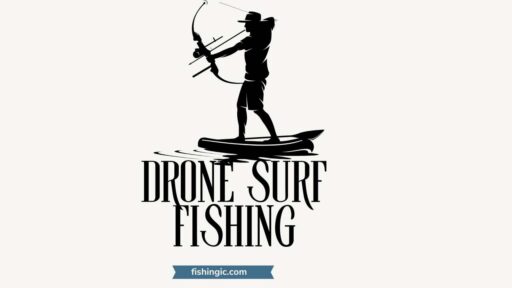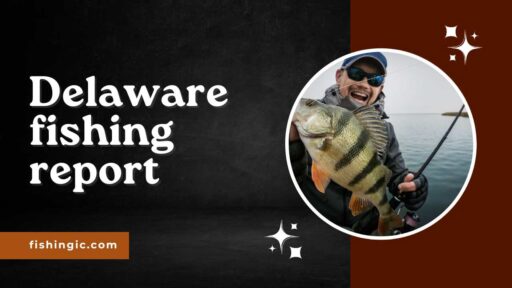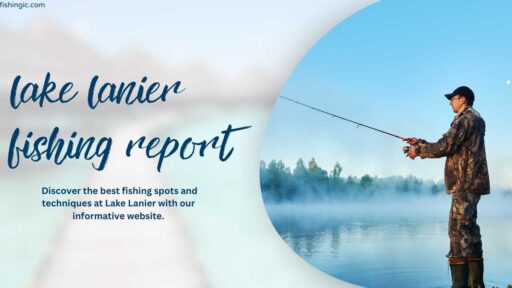Explore the significance of reducing speed when approaching Why should boaters slow down while passing recreational fishing boats? Find out how this simple action ensures the well-being of both boaters and anglers.
If you’re a seasoned boater, your idea of a serene day might revolve around cruising through tranquil waters, feeling the rhythm of the waves, and relishing the gentle ocean breeze. But have you ever considered the impact of your passage on those small, stationary vessels dotted along the water – the recreational Why should boaters slow down while passing recreational fishing boats? While zipping past these boats might seem like an exhilarating experience, it could potentially disrupt a fisherman’s catch or, worse, pose safety risks. Your actions matter, and that’s why we’re discussing this today: to highlight why you should be mindful and slow down your boat when passing fishing vessels.
“The boat you operate is not just a vehicle; it’s a responsibility – a duty to respect other waterway users and the marine environment.”
Now, slowing down might not seem like a significant action, but it’s the ripple effect of this seemingly minor adjustment that makes all the difference. This simple act could potentially prevent accidents, protect the marine ecosystem, and encourage a harmonized marine environment. So, let’s jump into it and unravel why, as a boater, you should always consider pulling back on the throttle when passing recreational ice fishing boats.
Right of Way
When you’re out sailing, it’s essential to remember the right-of-way rules. But not only for formalities or legal aspects, even though they apply too. It’s mainly a matter of safety and respect. The sea is a shared space, and water enthusiasts from all walks of life should feel secure and respected as they navigate waters worldwide.
In particular, it’s vital to be considerate when approaching or passing recreational fishing boats. These watercraft often move at slower speeds, with fishers focused on their lines rather than oncoming boats. While your vessel’s throttle might be itching for a rev, it’s not just courteous to decelerate; it is also safer. A high-speed pass can generate a significant wake that could capsize a smaller boat, jeopardizing both the vessel and everyone onboard. It could also scare off any fish around, spoiling the fun for those on a fishing trip.
Nautical charts from NOAA’s Office of Coast Survey can be helpful tools for navigating safely. These charts can help you avoid shallow water, protecting both your boat and the marine wildlife habitat. This way, both people fishing and marine life can remain safe and unbothered. However, do remember to refer to them frequently, especially in unfamiliar waterways.
The rush of zipping across a sun-drenched lake or the open ocean is a thrill many boaters chase, but safety should always take precedence over speed. This means checking the weather forecast before setting out and using tools like the NOAA Weather Radio for marine watches and warnings. After all, changes in the weather can affect water conditions, making it unsafe for both you and any nearby fishers.
Last but not least, whether you’re a novice boater or a seasoned veteran, you should always wear a properly fitted life jacket. It’s a simple precaution that can be lifesaving in unforeseen circumstances. Remember, slowing down, staying alert, and practicing safe boating habits ensure not just your safety but also the safety of others enjoying the waterways alongside you.
Reducing Wake: The Importance of Slowing Down Near Fishing Vessels
Navigating your boat at moderate to low speeds when near recreational fishing boats provides a safe haven not only for you and your passengers but also for others sharing your love for the water. Mapping your vessel’s course responsibly demonstrates maritime courtesy, and here’s why it matters.
Firstly, remember that the top floor for navigational safety is awareness. Recreational fishing vessels often pause in shallow waters, sometimes amidst aquatic habitats. Cruising at high speeds could mean fewer reaction times to avoid a potential marine accident if there’s a sudden encounter. Also, using NOAA’s nautical charts can assist in avoiding shallow terrain and assessing the surrounding area.
Moreover, wildlife habitats are delicate ecosystems. For their well-being, the rule of thumb is to keep some distance. Be it watching whales or observing the occasional sea turtle, maintaining a safe distance is crucial. This helps avoid disturbing these beautiful creatures or harming their habitats. Anchoring your boat in sensitive habitats like coral reefs or oyster beds is an absolute no. Therefore, slowing down near such spots can help protect these natural wonders.
Additionally, slowing down reduces the wake created by your boat, reducing the chances of disrupting other boaters who are fishing or enjoying a calm day on the water. The generated waves from the wake can cause other vessels to capsize, or jostle them, posing risk to aboard passengers and gear.
Importantly, by adopting a mindful speed, you promote clean waterways like securing trash onboard your boat, washing and drying it after trailering to prevent the spread of invasive species, and reducing speed is similarly substantive. It lessens the chance of stirring up sediments, which could cloud the water and harm the aquatic ecosystem.
Finally, remember that safety should be your utmost priority. Always wear a properly fitted life jacket when on board. Take heed of the weather forecasts, and carry a NOAA Weather Radio for marine watches and warnings.
These reasons show why being a slow-and-steady boater near fishing vessels earns you waves of appreciation from fellow water enthusiasts. Above all, it’s about enjoying the water responsibly and creating a harmonious environment for all.
The Dangers of High Speeds Near Why Should Boaters Slow Down while Passing Recreational Fishing Boats: What Every Boater Should Know
When you’re zipping across a sparkling waterway on a sunny day, the feeling is truly exhilarating. But here’s the catch – it’s crucial that you maintain a cautious speed, particularly around recreational fishing boats. Let’s delve into why this is so essential.
First and foremost, reducing your boat’s speed in the vicinity of fishing vessels is of paramount importance for maintaining safety. Operating at high speeds can potentially lead to disastrous collisions, endangering the well-being of everyone involved. This is especially true for busy waterways, which see a large share of the 12 million registered recreational boats in the U.S. making their way to lakes, rivers, and oceans for various pursuits. Moreover, the effects of such incidents go beyond human safety. Animals in the vicinity may also be adversely affected, leading to potential interruptions in local wildlife habitats and ecosystems.
At high speeds, your boat’s wake becomes increasingly larger and more disruptive. This turbulence, created by the force of your vessel moving through the water, can easily destabilize nearby fishing boats, causing discomfort and danger and even capsizing them in extreme cases. Do the responsible thing – keep your speeds down and your fellow waterway users in mind.
Remember, the objective is not merely about protecting fellow boaters but also observing responsible practices to ensure the welfare of marine wildlife. When passing through sensitive habitats, for instance, high velocity could cause unintentional harm to the marine life residing there. Furthermore, while anchoring around fishing vessels, one should always check the bottom for hazards or consider utilizing a mooring ball if available. This helps to preserve and protect important habitats like coral reefs and oyster beds.
Ultimately, staying within safe speeds while out on the water is about courtesy, respect, and responsibility. Before setting out, always remember to check the weather forecast, keep a weather radio handy, and use nautical charts for safe navigation. By following these practices, you will not only enjoy a safe boating experience but also contribute to the health and wellness of our shared waterways and their rich inhabitants. So, the next time you’re on board, slow down and savor the journey. After all, the tranquility comes not from the speed of the boat but from the rhythm of the water.
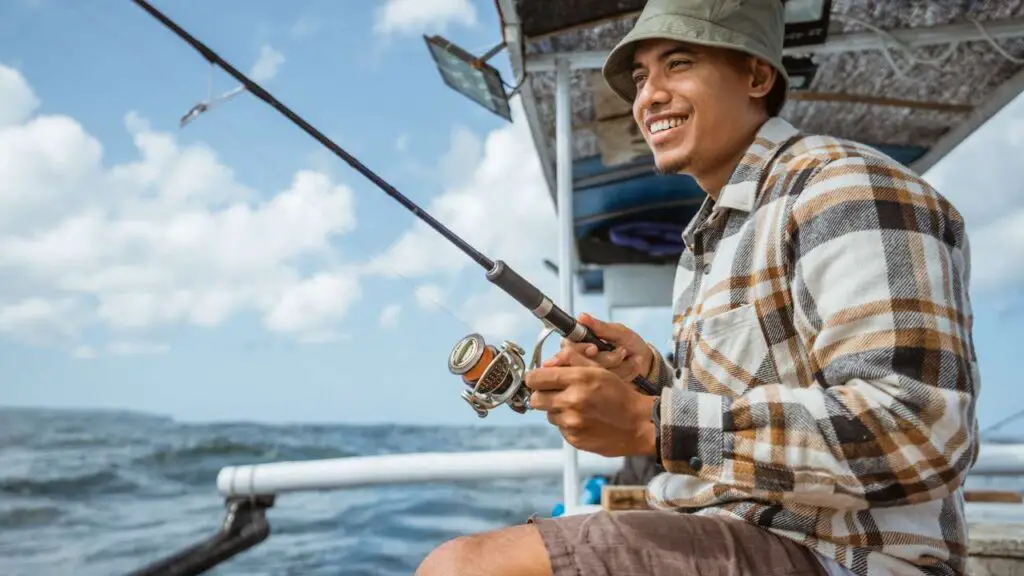
Credit: www.pexels.com
Essential Tips for Safely Navigating Around Fishing Vessels
- Recreational activities around water bodies such as lakes, rivers, or the ocean are popular destinations for boaters and fishers alike.
- Interestingly, there are over 12 million registered recreational boats in the U.S.
- Respecting wildlife habitats during boating activities is not only an ethical practice but can also save your boat from unsuspected hazards. Checking the bottom for obstacles before anchoring and maintaining a safe distance from marine wildlife is advantageous.
- Being mindful of the place you anchor your boat is crucial for the ecosystem. Preferably use mooring balls if available and avoid anchoring in sensitive habitats like coral reefs and oyster beds.
- Getting stranded is a possibility in boating; should such an unfortunate event occur, turn off your engine and call for assistance instead of trying to power through it.
- Using nautical charts from NOAA’s Office of Coast Survey lets you fortify your navigation around fishing vessels and also enhances overall safety during your trip.
- A rightly fitted life jacket is an indispensable tool for any boater, and it should be worn at all times on your boat.
- Checking the weather forecast before venturing out in the water is crucial, and having a NOAA Weather Radio on board for marine watches and warnings is always a smart move.
- Boating in shallow water puts both your boat and the wildlife habitat at risk. Therefore, it should be avoided wherever possible.
Encouraging Waterway Harmony: Slowing Down Around Fishing Boats
When there are 12 million registered recreational boats vying for space on U.S. waterways, harmony on the water comes down to respectful relationships and sound practices. As a boater, one of these sound practices is slowing down as you pass fishing boats. But why is this essential?
Recreational fishing areas are often rich in underwater habitats, including coral reefs and oyster beds. Zipping across these areas not only endangers your vessel but has devastating effects on these delicate ecosystems. Setting anchor without checking could lead to significant damage to such habitats. Simply using a mooring ball, if available, or turning off the engine could potentially protect these vulnerable areas.
Navigating the waterways is part art, part science, and the NOAA’s Office of Coast Survey offers nautical charts that enable you to understand and respect these habitats. Remember, a mindful boater contributes significantly to the health and longevity of these habitats, which, in turn, ensures the joy and thrill of recreational boating for future generations.
But what about the fishermen themselves? If a boater approaches a fishing vessel at high speeds, it can create a dangerous wake that could put the fisherman’s safety at risk. A sudden large wake could cause them to lose balance, possibly falling right off the boat, or it could even capsize the fishing boat. So slowing down isn’t just good manners—it’s necessary for safety.
Finally, when we share waterways with marine wildlife, it’s crucial to maintain a safe distance and respect their space. Carelessly plowing through their habitat could lead to harmful encounters. In an especially unfortunate scenario, a whale could get caught in your boat’s propeller. Hence, slowing down and being vigilant about your surroundings and the marine wildlife helps protect both your safety and theirs.
Together, we can create a more harmonious, safe, and sustainable waterway experience. It all starts with understanding why we need to slow down when passing fishing boats. So drop your speeds, enjoy the ride, and make our waterways a better place for all.
Frequently Asked Questions
Why should I slow down when passing fishing boats?
When you are out on the water, respect for everyone’s safety and experience is paramount. Speeding close to a fishing vessel can create a large wake. This can destabilize the fishing boat and potentially endanger those on board. Slowing down reduces the size of your wake and promotes a safer environment.
I’ve heard about “Right of Way.” What does this mean?
In the context of boating, Right of Way refers to who has the right to continue their course and who should yield to prevent a collision. It’s a crucial aspect of nautical rule to maintain safety and harmony on waterways. As a rule of thumb, boaters should slow down and allow recreational fishing boats to continue their course.
How can I ensure I navigate safely around fishing vessels?
Nautical charts provided by NOAA’s Office of Coast Survey can be invaluable for safe navigation. These maps provide details about water depth and potential hazards, aiding you in steering clear of fishing boats. Also, maintaining a keen lookout for buoys, marked fishing lines, or individuals fishing can help avoid unexpected encounters.
What should I do if I run aground near a fishing boat?
If you run aground, stop the engine immediately to prevent further damage to your boat or the environment. If you need assistance, NOAA’s SARSAT System is in place to assist boaters who are in distress.
How can I respect wildlife when boating near fishing vessels?
Waterways are teeming with wildlife, and some areas could be their habitats. Remember to maintain a safe distance when observing marine animals and follow guidelines related to wildlife viewing. Also, secure your trash and avoid dumping garbage overboard to keep our waterways clean.
Does weather have an impact on boating near fishing vessels?
Absolutely! Before heading out on the water, keep an eye on the weather forecast. Turbulent weather can make navigation more difficult and can increase the risk of collision. Carrying a NOAA Weather Radio on board can ensure you are alerted to marine watches and warnings.
Conclusion of Why should boaters slow down while passing recreational fishing boats
Boating near fishing vessels can be an exciting and enjoyable experience, but it is important to always keep safety in mind. By respecting wildlife, following guidelines for wildlife viewing, and being aware of weather conditions, you can ensure a safe and enjoyable boating trip for both yourself and the marine animals around you. So, next time you set out on the water, remember to stay alert and respectful towards your surroundings for a fun and responsible boating experience.
